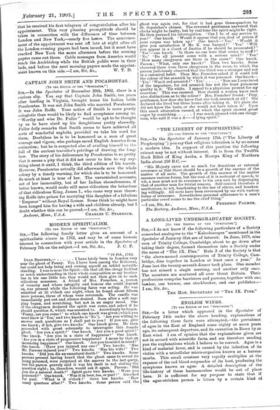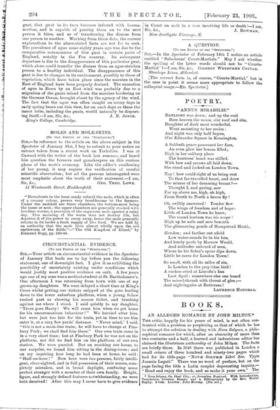ENGLISH WINDS.
[To THE EDITOE Or TEE "SPECTATOR:I Sur,—In a letter which appeared in the Spectator of February 14th under the above heading, explanations of the following three facts were attempted,—the prevalence of ague in the East of England some eighty or more years ago, its subsequent departure, and its causation in Essex by an East wind. I am of opinion that the explanations given are not in. accord with scientific) facts, and am therefore sending you the explanations which I believe to be correct. Ague is a kind of malarial fever, and is caused by the infection of its victim with a unicellular micro-organism known as a haema- moeba. This small creature very rapidly multiplies at the expense of the red blood corpuscles of its host, producing the symptoms known as ague. A. detailed description of the life-history of these haemamoebae would be out of place here. It is sufficient for my purpose to state that if the ague-stricken person is bitten by a certain kind of gnat, that gnat in its turn becomes infested with liaema- moebae, and is capable of passing them on to the next person it bites, and so of transferring the disease from one person to another. Working from these data, the correct explanations to the above-stated facts are not far to seek. The prevalence of ague some eighty years ago was due to the comparative commonness of this gnat in certain parts of England, notably in the Fen country. Its subsequent departure is due to the disappearance of this particular gnat, which alone could transfer the disease from an ague-stricken person to a healthy individual. The disappearance of this gnat is due to changes in its environment, possibly to those of vegetation, which have taken place since the marshes in the East of England have been properly drained. The causation of ague in Essex by an East wind was probably due to a migration of the gnats inland from the marshes bordering on the German Ocean, brought about by the agency of the wind. The fact that the ague was often caught on sunny days in early spring bears out this view, for on such days as these the insect tribe, including the gnats, would naturally be disport-











































 Previous page
Previous page